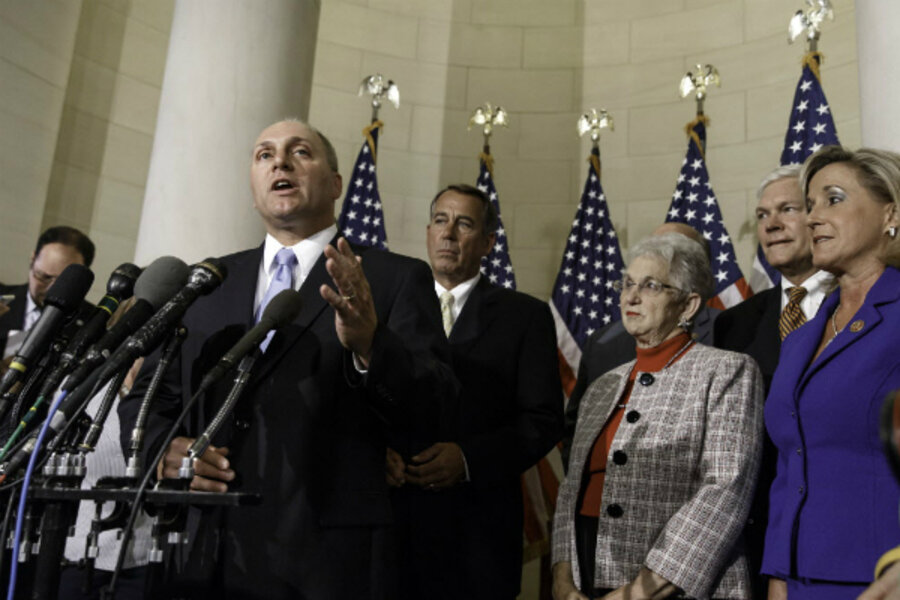Immigration reform? Nah, these are the GOP's three biggest battles.
Loading...
| WASHINGTON
Last week, some House Republicans brimmed with confidence at the unity expressed in members’ strong backing of two new House GOP leaders: Kevin McCarthy of California, who was elected to the No. 2 slot as majority leader, and Steve Scalise of Louisiana for the third spot, as majority whip.
“In both cases, it’s a strong consensus for our conference,” said Rep. Steve King of Iowa, smiling.
But the ebullience of a week ago will be quickly challenged, if not by ideological and tactical differences between the men – Mr. Scalise is a red-state Southerner close to the right wing of the House GOP, Mr. McCarthy is a blue-state Westerner seen as more moderate – than by issues on the near horizon.
Given the nearing midterm elections, the time for doing big things such as immigration reform or overhauling the tax code is rapidly winding down, if there ever was such a time. It’s the day-to-day business that may well spell trouble. Here are three issues to watch for:
Filling potholes. The federal fund that helps states pay for highway maintenance and improvement is about a month away from a shortfall. That means there will not be enough in it to meet expected road construction bills from states.
The US Department of Transportation says that hundreds of projects and thousands of jobs are at risk, not to mention the good humor of America’s driving vacationers.
The House GOP leadership had a plan to patch this shortfall: Pay for it by stopping Saturday delivery by the US Postal Service. But support for that option fell apart earlier this month.
Meanwhile, lawmakers are struggling to find a fix for the long-term solvency of the fund, which depends on the federal gas tax. Last week a Republican and a Democrat in the Senate called for a 12-cent-a-gallon increase in the gas tax. They say they need six months to build support for it. McCarthy just told Fox News Sunday he’s not buying the idea.
Right-wing conservatives see the debate over short- and long-term highway funding as an opportunity to pitch their idea: drastically reduce the federal gas tax and kick most highway funding back to states to manage.
The budget – again. Yes, there was a bipartisan budget deal in December. But the money still needs to be appropriated among the various government agencies and approved by Congress. That process was moving along pretty well until the first appropriations bill – three different bills rolled into one – hit the Senate last week. It got bogged down in a typical partisan floor-fight over amendments, even while other appropriations bills got stuck in Senate committees.
The danger here is that the budgeting process grinds to a halt, or gets way behind schedule; that the appropriations bills are not passed in time for the start of the next fiscal year on Oct. 1, and that a short-term continuing resolution is needed to keep the government open while a solution is worked out.
Tea party conservatives in both chambers have, in the past, used these deadlines as leverage to drive hard bargains or – as the country saw last year, shut down the government.
The Export-Import Bank. A Sept. 30 deadline looms to renew the charter for this bank that helps foreign buyers who want to purchase US exports by providing loan guarantees and credit insurance.
Conservative House Republicans, including Financial Services Chairman Jeb Hensarling of Texas, want to let the charter expire. They call it corporate welfare – government interference in the free market on behalf of big business. McCarthy announced on Fox News Sunday that he, too, is willing to let it go.
“This is a direct result” of a conservative challenge to McCarthy in last week’s election, says Matt Kibbe, president of FreedomWorks, a tea party group. There’s “a growing block of votes in the Republican conference to move away from crony capitalism and toward fiscal responsibility,” Mr. Kibbe says.
The clash here may not be between House leaders, but between them and America’s traditional business groups – the US Chamber of Commerce, the National Association of Manufacturers, and the National Small Business Association. These lobbyists all heavily favor the bank as indispensable to America’s exporters.








